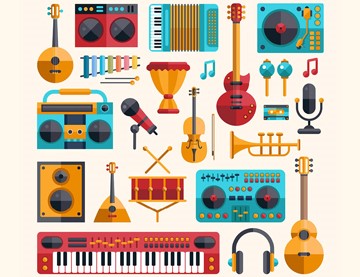Banner Image

Step by step the importance of music is finding a place in our education system and we are not talking about just learning to play the saxophone but actually using music as a tool to help develop our brains.
Music incursions and workshops are being incorporated into the curriculum as more and more research reveals the benefits of music. Exposure to the right kind of music and sounds in the early years helps to develop a higher IQ in the teenage years. Music helps to develop reading skills, verbal memory and mathematical skills. It also helps to increase concentration and attention.
There are very few people who can deny ever cranking up the car radio happily tapping the wheel to a favourite playlist. Music has the ability to improve mood, decrease anxiety, and facilitate opportunities for emotional expression.
Research suggests that music education can have major positive impacts on growth and development. Music can benefit our physical and mental health in numerous ways. Music therapy is used in hospices and palliative care facilities to enhance emotional wellbeing as a non-conventional treatment for a variety of illnesses and diseases, it stands to reason that music programs would benefit all students regardless of musical inclination or talent.
There are several music programs and music excursion providers that have developed programs specifically orchestrated ( excuse the pun) to encourage children’s creativity through music & dance. These incursions are usually tailored to your school's needs and can be incorporated into your timetable ranging from 60 minutes to a full day or over a whole term.
Recent evidence suggests the area of the brain controlling both musical ability and language comprehension are more interconnected than previously thought. Music education requires students to recognize and repeat tone, rhythm and pitch,
Drummer or Strummer?
While you may be disappointed that your child is only playing the triangle in the school play and not the lead guitarist, it's important to know that even a basic introduction to an instrument can be very beneficial. Playing a musical instrument has long been known to enhance dexterity and hand-eye coordination. This opportunity to grow motor skills is especially important in younger children. There is tremendous brain activity involved in playing a musical instrument, from following a conductor, listening, memory, following your fellow musicians, playing the correct notes, reading music, keeping a rhythm and often managing opposite hand motions. It has been found that musicians can employ both the left and the right sides of the brain in an effective way to process all this information.
So irrespective of the instrument choice music induces a feeling of wellbeing, increases focus and it has also been found that a student learning an instrument will have better verbal and mathematical skills owing to the comprehensive auditory and creative development learning a musical instrument provides.
Listening to Music
Listening to music boosts auditory skills. Students of music can thus recognise sounds and have enhanced speech capacities. The most commonly known effect of music on the brain is the “Mozart Effect” - which specifies that listening to music created by Mozart uplifts one’s mood, drops blood pressure and increases the brain capacity. Having stated all this, you really do not need to be musically inclined, just dancing, humming, twirling and singing along is a creative way to communicate, build cultural identity, convey an emotional experience, and explore a passion.
Inspiring creativity
There are several music programs that offer a range of workshops that connect with the Australian curriculum and again not necessarily just for music students. There are programs that include aural games, exercises to boost confidence, promote expression, body percussion and inspire creativity in motion.
Australian Dance Incursions can include any style from traditional to modern day music by indigenous and Aussie pop artists. Multicultural Dance Workshops from Bollywood Dance, Indonesian, Peruvian, American Hip Hop, Vietnamese, Afro-Latin, & many more. These providers are well equipped to take your students on a magical adventure to each of the countries.
How do you incorporate Music into your classroom ?
Music education is an important aspect of providing children with a well-rounded education. When incorporated with other subjects and areas of study, music helps children build essential skills, grow in self-esteem and prepare for bright futures.
Even if you have no prior music experience there are many exciting possibilities for integrating music into your learning environment. Whether your goals are to bring alive a history lesson, inspire poetry in motion or looking to create a calm mood for focused work, music can be used to positively shape your classroom environment and support your students to thrive.
When considering the use of music in the classroom, it is important to first identify the ways it can be most effectively integrated so feel free to read more about what some of the music program providers offer and how that meets the needs of your students.
Looking for ideas for musical incursions? See some of our favourites below or search our site for more School Incursion options.
SEL Wellbeing and Aboriginal Studies
